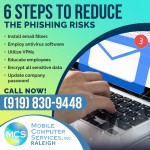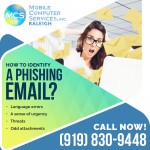Wednesday, September 8, 2021
Thursday, July 29, 2021
Mobile Computer Services, Inc. Shares 10 Ways to Protect Data in an Organization
10 Simple Ways to Secure Data
Data and web threats are a stark and unavoidable reality of the world today. Whether it’s a large-scale enterprise or a start-up, any manner of data breach can lead to massive disruptions in the daily operations of a business. Mobile Computer Services, Inc. - a managed IT service company - shares 10 effective ways that small businesses can follow to safeguard their data and network:
1. An IT strategy
An incident-response strategy will not only ensure the right steps are taken but will also prevent any further errors. A formal IT security strategy must be exhaustive and accessible to all relevant personnel. It not only presents how to protect data and resources but also shares what steps to take in case of an emergency.
2. Malware protection
Malicious software can sneak into PCs and network systems and wreak havoc on an organization’s data. Data threats can be prevented by securing PCs and network systems against malware in the following ways:
- Firewall: The router’s onboard firewall is the first line of defense against data breaches. Although by no means is this sufficient.
- Protection software: Sophisticated security software can deal with identity theft, suspect websites, and hacking without impacting the performance of the computer or network.
- Anti-spam: Keep the emails clean with Anti-spam software. It is important to take precautions and stop these spams from creating risks and distracting employees.
3. Wireless setting
A wireless network without a fort of encryption is a sitting duck for hackers. An encryption key may be unable to deflect hackers and therefore a stronger defense is required. An organization can strengthen its router by applying the strongest encryption setting, and turning off the broadcasting function to hide the company network. What can’t be seen cannot be tampered with.
4. Safeguard passwords
A password may seem too simple a suggestion but is one of the best ways to fortify data. The more complex the passwords, the better the protection.
A password must ideally be at least eight characters long and include numbers and non-standard characters within it. A regular change of password is also an important step to follow to optimize data security.
5. Personal device security plan
Certain small to medium organizations that encourage or allow a “Use your own device” policy at the workplace or homes must be aware of the associated security risks. They must have a plan to provide some protection against legal repercussions and mobile system costs. A clear, comprehensive policy must cover pertinent data deletion, location tracking, and Internet monitoring issues.
6. Automatic software updates
An older version of the software makes the device easy prey for hackers. Regular updates of device security settings, operating systems, and other software to their latest versions can safeguard the system against potential threats. Setting any patches and improvements to automatically update in the background can offer an extra layer of protection against hacking.
7. Background checks
Due vigilance while hiring a new employee is crucial to protect the organization from internal threats. A background check is necessary to know one’s employee well. Even sudden changes in employee behavior may indicate other issues that need redressal.
8. Data disposal
Disposing of redundant data is not as simple as deleting it. There must be a sound data destruction policy to ensure there is minimal risk of a security breach. This policy must advise the step-by-step procedures to safely dispose of data for all devices.
Confidential company data must be properly removed from retired and reused devices and storage media so it wouldn’t fall into the wrong hands. The data must be overwritten multiple times by the IT disposal partner to ensure it cannot be accessed by freely available tools.
9. Data backup
Besides cybercrime, there are a host of technical problems such as power outages or infrastructure damage that can lead to corruption or loss of data. Even a minor delay can escalate into a huge financial and reputational damage situation. Backing up data is an essential practice that will always keep the organization prepared for the worst and maintain continuity of work.
A cloud service for instance is a good option for storage of data, maintenance of software patches, and implementation of security for small businesses.
10. Employee education
During onboarding or bi-annual refresher courses, the company security policy must be reiterated to employees to ensure everyone follows it. Additionally, employees must be educated about phishing practices and how to identify scams and precautions they can take.
Why Mobile Computer Services?
Mobile Computer Services is a professional IT services company that works with small and medium-sized businesses in Wake Forest. The services include:
- Managed IT services - 24x7 proactive monitoring and management of the company's IT infrastructure.
- Network services: Comprehensive care for the network systems provided by certified technicians.
- Business continuity planning: Get the business back on its feet swiftly during and after disasters.
- IT consulting: High-caliber advice from professional consultants to help achieve business goals.
- Security: Safeguard business from malicious hackers and cyber attacks.
- On-demand services: Day or night, the dedicated support staff is always available to assist.
- Office move: Professional office relocation and network cabling services.
- VoIP: Reduce telecom expenses and improve communications with powerful phone systems.
- Email Protection: Protect mail systems from spam and malware.
Contact Mobile Computer Services, Inc. at Wake Forest today at (919) 230-2900 for IT support, services and solutions.
How to Recognize Phishing Attacks and Prevent Them
How to identify phishing scams and prevent them?
Statistics have revealed that 90% of all data breaches can be traced back to phishing attacks. The average cost of a successful phishing attack to a medium-sized business is estimated at $1.6million. Mobile Computer Services, Inc. - a managed IT company - shares how to identify phishing scams and reduce the risk they pose.
What is a phishing scam?
Phishing is a type of social engineering attack wherein a victim is duped into sharing confidential data, including login credentials, banking details, and other personal or business information with a hacker. Phishing can not only lead to significant financial loss but also cause loss of sensitive company information, such as revenue figures.
Traditionally carried out only via email, phishing scams are now being carried out via text message (smishing) and phone calls (vishing) as well. Moreover, spear-phishing – personalized phishing attacks on a particular target – has become rampant.
Ransomware - the Trojan horse
Besides gaining precious confidential information from the target, phishing scams can also be used to plant ransomware on a device. It is a form of malware that encrypts the data on the victim’s device disabling any access to all files and information. This is followed by a payment demand or a “ransom” by the cybercriminals to decrypt the data and provide access.
Ransomware is a dangerous malware that is capable of bringing even the largest organization to a standstill.
How to identify a phishing email?
Language errors
A careful read of a message can reveal its authenticity. For instance, an email from the bank asking for personal information updates is unlikely to have grammatical and spelling mistakes. Or an untimely mail from a colleague with an unusual amount of language errors must be viewed with caution.
Phishing emails can seem very genuine until a closer look reveals complex subdomains that mask the actual identity of the sender. One must refrain from clicking on the attachments on such links.
A sense of urgency
A sense of urgency in a message takes away the attention from the telltale signs of inauthenticity. Hackers often use a sense of urgency by suggesting a hacked account that needs to be reset or by offering a time-specific promotion or reward. More often than not, this sense of urgency lures the victim into providing information without confirming the genuineness of the sender.
Threats
Phishing victims may often receive messages threatening to reveal some information to others. This threatening message may demand personal information or simply carry an attachment that once opened will install ransomware on the device, locking all access to data.
Odd attachments
A simple rule to follow online - do not open an attachment contained in a mail from an unknown person or entity. An attachment with an unusual name or a URL that doesn’t begin with HTTPS and has no SSL certificate is not worth the click.
6 steps to reduce the phishing risks
Despite the awareness, some phishing messages may not have any tell-tale signs of being dangerous and fake. But there are certain steps businesses can take to protect themselves and their employees from phishing scams.
Install email filters
Researching for an email provider that has effective spam and junk mail filters is worth the effort before making a choice. However, just an email filter is insufficient protection from malicious emails.
In case of serious phishing concerns, the hyperlinks can be disabled on email settings but this will also block links from authentic senders.
Employ antivirus software
An up-to-date antivirus software protects a business from phishing attacks as well as other types of dangerous threats. Businesses can install antivirus software that is equipped with anti-phishing capabilities that will check links for authenticity and safety. However, it is important to regularly scan the devices as phishing scams may go unnoticed.
Utilize VPNs
If a business utilizes public WiFi connections to access sensitive information, an effective Virtual Private Network (VPN) can decrypt the data during the online activity and provide the much-needed security.
However, one must not access bank accounts or sensitive company information on an unsecured network as it heightens the risk of phishing attacks.
Educate employees
Lack of awareness leads to successful phishing scams. Educating employees is the first step to protecting the business. Simulated phishing tests are a great way to ensure that employees understand and recognize phishing scams.
Encrypt all sensitive data
Encryption of all sensitive information and files is another layer of defense against phishing. This information can only be decoded and accessed by personnel who have the sender’s cipher/key. Encryption can be carried out on a small or large scale depending upon the company's needs. Additionally, some modern operating systems (OS) have built-in encryption programs (such as OS X, Windows, Linux).
Update company password
A policy of regular password change is advised to protect the company's information. But this must be enforced without fail when there has been a security breach or an equally compromising situation. Ideally, passwords should be strong, long, and use two-step or multi-factor verification.
Why Mobile Computer Services?
Mobile Computer Services is a professional IT services company that works with small and medium-sized businesses in Raleigh NC. The services include:
- Managed IT services - 24x7 proactive monitoring and management of the company's IT infrastructure.
- Network services: Comprehensive care for the network systems provided by certified technicians.
- Business continuity planning: Get the business back on its feet swiftly during and after disasters.
- IT consulting: High-caliber advice from professional consultants to help achieve business goals.
- Security: Safeguard business from malicious hackers and cyber attacks.
- On-demand services: Day or night, the dedicated support staff is always available to assist.
- Office move: Professional office relocation and network cabling services.
- VoIP: Reduce telecom expenses and improve communications with powerful phone systems.
- Email protection: Protect mail systems from spam and malware.
Contact Mobile Computer Services, Inc. at Raleigh NC today at (919) 830-9448 to find out about its Managed IT services.
Wednesday, October 21, 2020
Managed IT Service Explains Four Common Cybercriminal Phishing Emails
Dental practices, veterinary clinics, and small businesses must keep their guard up in the effort to maintain cybersecurity. Vulnerabilities can spell disaster. IT managed services are a burden that most small businesses are unable to shoulder alone. An outsourced managed IT solutions provider, such as Mobile Computer Services, Inc. of Wake Forest, is an affordable way to gain the cybersecurity every business needs to stay safe and functional in the “new normal” of accelerated cybercriminal activity.
Four types of phishing pose a critical threat to dental practices, veterinary clinics, and small businesses:
- Spear phishing
- Clone phishing
- Whaling
- Pop-up phishing
Spear phishing
The majority of phishing emails targets large groups of people. Spear phishing is a type of attack that is more personalized and individual in its approach and focus.
A spear-phishing email, as the name implies, targets a specific individual, business, or organization. Dental practices and veterinary clinics are prime examples of entities that this variety of phishing expedition would single out. The scammers who spear phish invest time to research their niche targets. This more sophisticated phishing is sometimes referred to as social engineering. The emails are configured to closely resemble legitimate sources.
In 2016, millions of Amazon customers received an email containing the same subject line message about an order status with an order code following directly after it. Upon opening the email, consumers found no message, only an attachment. Customers who opened the attachment put themselves or their companies at risk of installing ransomware on their computers or other devices.
Another example of spear phishing emails specifically involves small businesses, including dental practices and veterinary clinics. The target, in this instance, might be a company employee. The email may seem to originate from higher up the management chain, and it requests access to sensitive company information. If the spear-phishing target responds, a data breach could ensue in which company or employee information is accessed and stolen.
Clone phishing
Another type of malicious phishing, clone phishing, is very difficult to detect. This phishing attack involves creating a version of an email that victims have already received. The email address is very close to the address of the original email, and the formatting of the body of the email resembles the original email, as well. The only difference is the attachment or link in the message has been changed. Unwary victims who click on the link or open the attachment will be taken to a fake website or open an infected attachment. This type of email phishing requires a keen eye and attention to detail to notice.

Whaling
Some phishing expeditions focus on the large catch, the whales. Whaling attacks target chief executive officers, chief operating officers, or other high-level executives in a business. The phisher’s aim is to con these powerful individuals into divulging sensitive corporate information. Any key decision-maker with sensitive information qualifies as a high-value target, including dentists and veterinarians, as well as other small business owners.
These attacks require a higher level of sophistication and much more research. The scheme usually relies on fraudulent emails that seem to originate from trusted colleagues within the company or from legitimate external agencies.
Pop-up phishing
Pop-up phishing utilizes pop-up ads to entice users into installing malware on their computers. The ads may seek to convince the recipient to purchase unnecessary antivirus protection. Scare tactics may be employed. The user might be warned that their computer has been infected with a virus and the only remedy is to install a particular antivirus software. Upon installation, the user discovers this software is non-functional. Sometimes the supposed remedy actually infects the computer with malware.
How can a dental practice, veterinary clinic, or small business protect against a phishing attack?
Small businesses can take simple, common sense, proactive steps to avoid being scammed by phishing expeditions. The application of several commonsense principles and a healthy dose of suspicion are a good combination when dealing with potential cybercrimes. Cybercriminals are smart. Their subtle machinations can hook the most astute business owner or employee. The following principles will help safeguard against falling for the scammer’s tricks.
- Delete suspicious emails.
- Do not click on suspicious links in emails.
- Do not send financial information through email.
- Avoid clicking on pop-up ads. Hackers can add fraudulent messages that pop up when the victim is visiting legitimate websites.
- Protect computers and other devices with strong, multi-layered security software.
Managed IT services are indispensable for cybersecurity in the twenty-first century. An outsourced IT support service is an affordable strategy to gain bullet-proof security and achieve peace of mind. For more information about IT solutions that work, contact Mobile Computer Services, Inc. of Wake Forest by phone at (919) 230-2900.
Wednesday, September 23, 2020
How to Spot COVID-19 Scam Emails
The COVID-19 pandemic has created subtle cybersecurity issues for small businesses. Mobile Computer Services, Inc. of Wake Forest provides cybersecurity advice on how to identify and avoid dangerous COVID-19 email phishing scams. The managed IT service providers build an email infrastructure that ensures a business can continue to utilize email as a safe and beneficial business tool.

A headline from The Wall Street Journal reads, “Don’t Click! Coronavirus Text and Phone Scams Are Designed to Trick You. Swindlers are taking advantage of the global health crisis, so watch out for email phishing, robocalls, and “smishing”—text-message scams sent to your phone.”
Billions of robocalls are annoying tens of millions of Americans. Unsuspecting and trusting individuals have shelled out vast sums of money to phone scammers and cybercriminals pretending to be government officials, health-care providers, IRS representatives, and more. As far as the robocalls, lawmakers find it all but impossible to make the calls stop. With the phishing (emails) and smishing (text messaging), commonsense strategies and IT managed email infrastructure security can address the cybersecurity issues.
The Wall Street Journal article begins with an all too common scenario. “A text comes in on your phone. It’s from the IRS, and your economic relief check is ready, pending your acceptance. There’s a form to fill out. All you have to do is click the link.”
With this introduction, author Nicole Nguyen brilliantly sets the stage for a straightforward solution that works every time. She writes, “If you don’t have time to read this whole column, please—for the love of sweatpants—just read this: Don’t Click The Link.”
The solution is not magical, nor is it an industry trade secret. Success at thwarting scammers does require some basic commonsense, self-discipline, and understanding of how to recognize fishy emails phishing for personal information.
News coverage in the dominant media culture surrounding COVID-19 has fostered phishing attacks seeking to exploit fears in the general population about the highly contagious and sometimes fatal virus.
How does the phishing scam work? Cybercriminals send bogus emails claiming to originate from legitimate organizations with vital data regarding COVID-19.
The email might direct the recipient to open a file attachment to read the latest statistics. Clicking on the file or embedded link may download malicious software onto the recipient’s device. The malicious software or malware enables cyber scammers to gain access to a computer, record keystrokes, or harvest personal information and financial data. Identity theft could be one of the painful consequences of this scam.
COVID-19 has impacted millions of lives worldwide. The long-term impact is impossible to predict. Effective steps are available to protect against COVID-related scams and mitigate the risk.
Spotting a coronavirus phishing email
Coronavirus-themed phishing emails appear in various forms, including the ones listed below.
- CDC alerts
Cybercriminals are creating emails that appear to originate from the U.S. Centers for Disease Control. The email may claim to link to a list of local coronavirus cases. The recipient is urged to immediately read the cases and glean safety hazards to avoid. Warning: Avoid clicking on the links! Granted, the emails may look official. Stay safe. Visit the CDC website directly for COVID-19 information.
- Emails giving advice on health issues
In these emails, scammers send offers of medical advice to help guard against COVID-19. The emails may purport to come from medical experts in Wuhan, China, the COVID-19 epicenter. The advice promises, “This little measure can save you!” Another scam strategy is “Use the link below to download Safety Measures.” Here is a simple, flawless cybersecurity safety measure: do not click on the link.
- Workplace policy emails
This form of phishing scam deserves extra attention. Employees’ workplace email accounts are information-rich targets for cybercriminals. A sophisticated phishing email might open with the casual greeting, “All, Due to the pandemic outbreak of COVID-19, [company name] is actively taking safety precautions by instituting a Communicable Disease Management Policy.” Clicking on the fake company policy will download malicious software onto the device. The eventual legal and financial impact could destroy the company.
How to avoid scammers and phony ads
Scammers post ads claiming to offer COVID-19 remedies and use language that creates a sense of urgency. “Buy now, limited supply” is a prime example.
Responding to the ads could have several negative consequences.
- Malware could be downloaded onto the device when a malicious link is clicked.
- The product is purchased but turns out to be worthless.
- Personal information such as name, address, and credit card number has been shared with a stranger who may use the information for identity theft or sell or trade the information to another cybercriminal who may use the information to cause mayhem in some person’s life.
A simple solution is to avoid any ads seeking to capitalize on the COVID-19 pandemic.
Tips to spot and avoid phishing emails
Follow these tips to spot and avoid pandemic-themed phishing emails.
- Be very cautious of online requests for personal information.
A pandemic-themed email requesting personal information such as a Social Security number or login information is a phishing scam. Legitimate government agencies do not request information of such a personal nature. Do not provide personal data to such an email.
- Verify the link or email address.
Hover the mouse button over the URL to inspect where the link leads. Sometimes, the website address is obviously fake. Scammers have become more sophisticated and will create links closely resembling a valid address. Take action if the ad is a scam and delete the email.
- Keep an eye out for spelling and grammatical mistakes.
As mentioned above, phishers have perfected their messaging either by hard work or through artificial intelligence and grammar tools.
- A generic greeting is a giveaway.
Phishing emails are unlikely to use the target’s name. Greetings like “Dear sir or madam” signal an email is not legitimate.
- Avoid pushy emails insisting on fast action and little research.
The heightened sense of urgency or demand for instant action is to drive readers to respond in fear and click on a link to provide personal information. The simple, failsafe solution is to delete the message right now!

To learn more about IT managed solutions and email cybersecurity, visit the Mobile Computer Services, Inc. of Wake Forest website at www.ncmobilecomputerservices.com/locations/wake-forest. Contact the office by phone at (919) 230-2900.
Wednesday, August 26, 2020
IT Management Company Explains How a VPN Protects Internet Activity
A virtual private network or VPN provides a secure internet connection and grants anonymity to a user’s web traffic. A VPN functions to establish a secure connection between a user’s device and a remote location by creating a tunnel from the device in use to the network of the VPN service provider. The internet traffic routes through this tunnel to the VPN server. From the server, the traffic flows to the desired website or internet service. The origin of the traffic is hidden by making it appear to originate from the network of the VPN service provider. All traffic is encrypted, thus veiling the actual IP address. Only the service provider is privy to the activity.
Most service providers allow users to choose the server location to which the VPN tunnel is connected. Traffic routes from the country of the server chosen for the connection to the user’s VPN.
Safe connection in public networks
When connecting to a Wi-Fi network, it is never possible to know if the connection is safe. The VPN encrypts the data in the connection, making web traffic interception by a hacker significantly harder. Joining unsafe networks becomes much less risky. Leisure and business travelers find the encryption feature to be of use since traveling often requires connecting to unsafe networks. Many countries engage in strict internet censorship and surveillance, and a particular internet destination might be blocked or illegal.
IP address hidden by VPN
Accurate web tracking requires many factors, and the IP address is only one way to trace a device. Concealing the IP address complicates the process of connecting web traffic to a specific individual. The user is not entirely unable to be traced on the internet, but tracking is more difficult.
Hiding the IP address prohibits the user’s internet service provider from seeing what a user is doing on the internet. The service provider cannot store personal or company data, sell it to advertisers, or relinquish it to authorities. A measure of anonymity is important because many governments do not respect internet privacy.
Virtual location changed to another country
With a VPN, a user is able to change the virtual location so that web traffic goes through another country. VPNs are useful to bypass limitations in countries where access to the internet and some internet services is more highly restricted. The same feature also enables accessing geo-blocked material, such as videos. Websites can detect VPNs and block such traffic if so desired.
The downsides of a VPN
VPN may slow the internet connection to some degree. The user may not notice any fluctuation or the speed may plummet. The use of a VPN can also decrease battery life on mobile devices and laptops.
Another downside is related to the VPN service provider. All web traffic goes through the service provider when a VPN is in use. Since the VPN service provider is in control of all the web traffic data, users must trust the VPN service provider to handle their data properly.
Free VPN services
If the desire is to access geo-blocked material or to reduce lag for gaming, then a free VPN service may be sufficient. If the VPN service is free, do not be surprised to discover that important personal data is being sold to third parties. Many free VPN providers are scams intended to spy on user data. Free VPNs may also run slower than paid options. If privacy is a priority, connect with a paid VPN.
Some VPN service providers also log user activity. Users should know if activity logs are being kept of their activity and for what purpose. The solution is to use a VPN service provider that can be trusted.
Location matters
The physical location of the VPN service provider is an essential piece of information to know. The laws of the host country prevail in matters of privacy. These laws can require the VPN providers to relinquish data to authorities upon request, thus potentially eliminating any privacy gained with the use of a VPN. Some VPN service providers issue a warrant canary to inform their users of any request to provide data to the authorities.
Conclusion
The VPN is a useful tool in the IT management toolbox that further enhances security and privacy. VPN is not a panacea. The technology and its applications have limitations. Consulting with a managed IT solutions provider can yield a strategy that meets the growing and changing needs of small businesses, such as dental practices and veterinary clinics.
For more detailed information about a VPN and its application in a specific setting, visit the Mobile Computer Services website at www.ncmobilecomputerservices.com/locations/wake-forest. Contact the office by phone at (919) 230-2900.
Wednesday, August 5, 2020
Wake Forest IT Management Company Provides Web Hosting Services
IT management and cybersecurity require a comprehensive strategy and constant attention. Threats are ever-present, and hackers are adapting and adjusting to perfect their cyber mischief. Mobile Computer Services, Inc. of Wake Forest is available as a resource for website hosting and cybersecurity solutions, along with full-service managed IT solutions. The services include network services, business continuity planning, IT consulting, cybersecurity, on-demand services, office moves, VoIP, email protection, and HaaS (Hardware as a Service).
Key features of the web hosting service include:
- Optimized cybersecurity strategies to thwart lurking cyberattacks
- Password and device safety
- Domain-based business-class email instead of a free service like Yahoo or Gmail
Web hosting services without comprehensive cybersecurity strategies leave a business vulnerable and can result in a cyber disaster, which may cost tens of thousands of dollars to repair. A hacked website can devastate a business, whether large or small. Nearly 60% of malware attacks are aimed at small businesses. Losing customer trust, website files, or search engine rankings is the last thing a busy small business owner needs to worry about.
Most cyberattacks are carried out by automated bots that crawl the web looking for vulnerable sites without considering the size or popularity of a business. No website is immune to a hacker attack. A bot can attempt to hack any website at any time, so security features are essential for every site.
Websites hosted by Mobile Computer Services, Inc. have access to a variety of security features already. Before considering a security upgrade, make sure to take care of the basics listed below.
Choose strong passwords and usernames
The easier a password is to guess, the more susceptible it is to being hacked. Components of a strong password include:
- Contains at least ten characters
- Uses both uppercase and lowercase letters
- Includes symbols such as asterisks, parentheses, and numbers
- Does not use common words like “password”
- Is not tied to known information about the user, like a last name or date of birth
Avoid common usernames like “Admin,” “Administrator,” or the name of the business. Instead, choose something personally meaningful but not obvious to a stranger.
Prevent brute force attacks
Coming up with strong passwords can be a challenge, which is why brute force protection is so important. Brute force attacks take place when a hacker or bot attempts to guess the correct username/password combination for a website’s admin dashboard. Automated software accelerates the process tremendously, up to several thousand attempts a second. Inquire about an MCS-hosted website with security features that can block these login attempts.
Use two-factor authentication to access the company website
Secure authentication provides an extra layer of security to a website login. After entering the website username and password, a code is sent to the user’s cell phone. The user will then have to input that code in order to access the dashboard.
Instead of just requiring a user to know the password, it requires a phone in their possession. Even if hackers or bots can identify a username and password, they will not be able to access the website without also having the user’s phone.
Two-factor authentication is incredibly effective. Google found that sending a code to a phone number blocks 100% of automated bots, 96% of bulk phishing attacks, and 76% of targeted attacks.
Use domain-based business-class emails instead of a free email service
Using domain-based business-class emails impacts brand value and cybersecurity.A business cannot distinguish itself as a business brand with an email ID like companyname@gmail.com. Anything less than a domain-based email looks unprofessional and fails to make a positive first impression with colleagues and customers.
Without the professionalism and credibility that a domain-based email lends to a business, customer trust is compromised. Most spammers and frauds also use a free email service.
Using a free email service like Gmail or Yahoo makes it easier for hackers and scammers to steal or compromise a company’s identity. Anybody can create an email ID on any free mail platform. By creating a mail ID with a business name with slight variations such as company-name@gmail.com, frauds can irreparably harm a business.
A business that uses a free email service instead of a domain-based business-class email has not positioned itself as well as it could. Using a free email service for a business is like having a well-known business at a great location (company domain name) with a well-developed infrastructure (company website) but using a nearby telephone booth (free email) for communication needs. When a business uses a free email service, it cannot be regarded as a reliable business by customers, competitors, or Google.
The benefits of having a domain-based business-class email include:
- Offers instant recognition and branding
- Promotes the business brand
- Conveys trustworthiness and integrity
- Communicates size and organization
- Looks more professional and earns credibility
Free email service providers offer nominal security and privacy features which expose critical business data to serious risk. Having emails on a private domain makes communication and confidential data more secure because many additional security measures can be utilized.
A domain-based business-class email is like a direct line specially installed to serve business communication needs while distinguishing the business as trustworthy, reliable, and professional.
Conclusion
Mobile Computer Services, Inc. offers these basic recommendations as a starting point for improving business IT management and cybersecurity. The web hosting resources complement the menu of services that the IT management company offers customers.
For more information about web hosting services, visit Mobile Computer Services, Inc. of Wake Forest on the web at www.ncmobilecomputerservices.com/locations/wake-forest. Contact the office by phone at (919) 230-2900.







